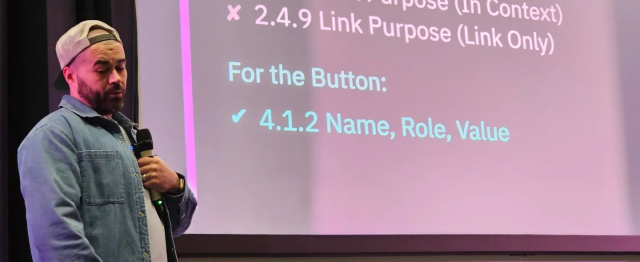"Screen readers do not need to be saved by AI"
TetraLogical's @craigabbott has written a post on his own blog exploring why we shouldn’t expect screen readers to be augmented with AI to fix problems with bad content.
The real problem is producing inaccessible content from the start, such as misusing emojis, poor descriptions, or unclear writing.
craigabbott.co.uk/blog/screen-…
#Accessibility #ScreenReaders #InclusiveDesign

Screen readers do not need to be saved by AI
Why LLMs should not be integrated with screen readersCraig Abbott (craigabbott.co.uk)
reshared this
Matt Campbell
in reply to TetraLogical • • •Matt Campbell reshared this.
Craig Abbott
in reply to Matt Campbell • • •Glyph
in reply to Matt Campbell • • •Glyph
in reply to Glyph • • •Matt Campbell
in reply to Glyph • • •Craig Abbott
in reply to Glyph • • •Glyph
in reply to Craig Abbott • • •Glyph
in reply to Glyph • • •Matt Campbell
in reply to Glyph • • •@glyph You're definitely right about Apple. I'm much more sympathetic toward NV Access, because they're a tiny non-profit working on an open-source project. And if I remember correctly, NVDA only gained an internal TTS API rich enough to support sound effects synchronized to individual words in like 2019 or 2020. (I had written that feature in 2003, for the purpose of indicating links with a tone, but I can understand having different priorities.)
@craigabbott @TetraLogical
Matt Campbell
in reply to Matt Campbell • • •@glyph The company that I _really_ think we shouldn't carry any water for is Vispero, the current owner of JAWS. Clearly at this point the company is mainly trying to squeeze more money out of what IMO can justifiably be described as the WinZip of screen readers. I make that comparison deliberately; WinZip was at one point owned by the same private equity group that invested in Vispero. And both products now have high-quality free counterparts.
@craigabbott @TetraLogical
Matt Campbell
in reply to Matt Campbell • • •Craig Abbott
in reply to Glyph • • •Glyph
in reply to Craig Abbott • • •Glyph
in reply to Glyph • • •Glyph
in reply to Glyph • • •Matt Campbell
in reply to Glyph • • •